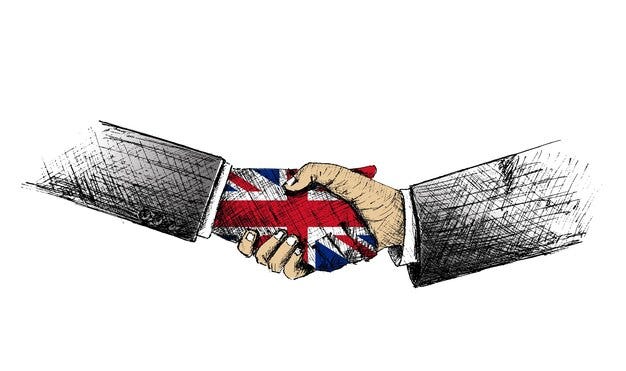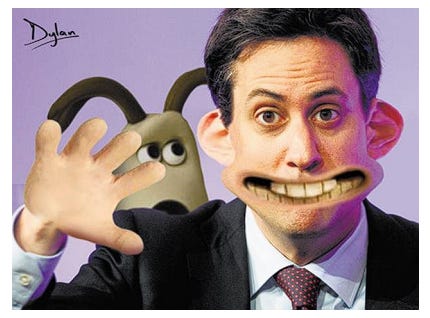HindeSight Letters Investment Insights Archive - READ HERE
Our FREE archive posts allow our subscribers to access valuable insights and analysis and a deeper understanding of market trends and investment strategies that were relevant at the time the HindeSight newsletter was published.
Additionally, reading archived newsletter content can give you a sense of the long term performance of the investments or strategies discussed which can be helpful in making informed investment decisions.
Furthermore reading this content can provide historical context and help you see how market conditions have changed over time, allowing you to better anticipate future developments.
Overall reading our archived content can be a useful tool for gaining a broader perspective on the market.
LIMITED OFFER. GET A 90 DAY FREE TRIAL OF OUR PREMIUM SUBSCRIPTION & MAXIMISE YOUR INVESTMENT POTENTIAL
INVESTMENT INSIGHTS ARCHIVE
Originally posted in May 2015
ONE NATION OR ONE PARTY NATIONS
By Ben Davies
My make believe twitter hashtag #GE2015WTF perhaps sums up the May 7th shock of a nation, or does it? As traders and investment managers, both Mark and I tend to be of the notion that if everyone is of the same idea, then they're all generally likely to be wrong. Opinion polls are like markets, they impose a reflexive process on the outcome of the election i.e. they impact it. Which reminds me, opinions (polls) are like arseh@les, and everyone’s got one. Well this arseh@le is going to give you his view of what went down, seeing as it's been a big theme of our Views and Election Investment Insights this past 6 months.
First, this arseh@le is going to pucker his butt and say we were of the opinion that Cameron was more likely to get a majority on the basis of the old mantra, "it's about the economy, stupid" and that Wallace (Ed) just didn't cut it as leadership material, with those gawky features of his. We suggested that what Spitting Image did for Kinnock, so Nick Park and Ardman Animations would do for Miliband. We can never know for sure, but the Drilldown APP we highlighted told us the reality of who was favoured. To give you a clue, it wasn't the pink, or was it the off-red team? These caricatures clearly struck a chord in both the 1992 and 2015 elections and cost both Labour leaders their respective election wins.
'The Curse of the Welsh Rabbit’ struck again. Sorry couldn't help myself.
Granted I admit that, with the electoral bias of the constituency boundaries, I too felt apprehensive that a coalition was more likely than not. Even when I compared the Shy Tories and the 'No, No, No…' years leading up to John Major’s 'surprise' 1992 win to this election, it was written with a healthy dose of realism, perhaps even hope.
These past six months, since writing ‘The Coupon Election’ in the HindeSight January Dividend letter, I leaned to the possibility of a Conservative majority for Cameron:
"I am going to go against the train of prevailing thought and suggest that it is within Cameron’s grasp to grab a majority victory…"
I'll claim that as a small victory, with a 'small c'.
More importantly, our portfolio was in a position to benefit almost regardless of who won the election, as some of the stocks were so beaten up and so feared the red peril they had nowhere to go relative to the index. The relief rally so far has been substantial. It pays to be contrarian. The polls made it possible to act as a true contrarian in the market place because so many believed it was going to be a tight race.
It could be argued that in the end the result was less of a shock to the voters, than to the opinion poll-led media and MPs standing for election who foresaw a hung parliament run by Labour as a slam dunk. We, the people knew, in our heart of hearts. Those of us (well, perhaps not me) whose jobs mean they are not able to hang-out on social media sites, unashamedly stepped up and stamped our vote – not our opinion, but our vote – on the pollsters.
The progressive metropolitan dialogue arrogantly believes it stands for the silent majority I wrote about last month. It doesn't. It was completely misguided in the absolute tripe it spouted. One of the more representative broadsheets rightly wrote that there is a 'small c' conservatism that represents the majority in Britain, what Margaret Thatcher once called the "thoughtful people of Britain... whose voice steadies each generation with a quiet but insistent message".
By the way, to you in the liberal media, Blair understood this. Which was why New Labour reigned supreme for 3 backto-back UK elections, and he arguably became one of the longest serving UK Prime Ministers in the modern political era. Blair played to the 'small c' with his centre-of-Left version of conservatism, which arguably did more to support the case for moderate conservatism than the Conservatives had even done themselves. Unfortunately for Labour, Blair had become so toxic that the logical conclusion, albeit a resoundingly wrong one, was that a new leader should distance himself from Blairism. The '-ism' was broadly right for the majority of people, it was just the Blair part that became just plainly wrong.
One Nation or One Party Nations?
In his acceptance speech outside Number 10, Cameron spoke of 'One nation'. It was not so much a hat-tip to Disraeli's One Nation conservatism, as rather an acknowledgement that if the United Kingdom was to remain as such, powers would have to be more devolved to the administrations of Belfast, Cardiff and Edinburgh:
"As we conduct this vital work we must ensure that we bring our country together. As I said in the small hours of this morning, we will govern as a party of one nation, one United Kingdom. That means ensuring this recovery reaches all parts of our country, from north to south, from east to west....
And of course it means bringing together the different nations of our United Kingdom. I have always believed in governing with respect. That's why in the last parliament we devolved power to Scotland and Wales – and gave the people of Scotland a referendum on whether to stay inside the UK...
Together, we can make Great Britain greater still."
My first reaction on seeing the results was, we will now have 'One Party Nations' with SNP leading Scotland and the Tories running England, the new ENP. We could also witness a Federal England with there being North and South regional splits. Cameron could turn the Tories into the party of English Nationalism, but he won't. His comments outside Downing Street reaffirmed he is a Unionist. He will and should give Scotland more devolved powers. The SNP will argue for priority devolution of powers over business taxes, employment, the minimum wage and welfare, as they strive to rebuild the Scottish economy. Why not offer full fiscal responsibility to Nicola, serving a severe dose of reality on her and the SNP? I suspect that will be his trump card in negotiations, though of course he has to solve issues such as how much Scotland contributed towards reserved areas, including defence, energy and even payments towards the UK debt interest.
Actually, what seems more likely than One Party Nations is more de-centralised powers in general, both in the Isles and in England. The shires and regions will receive more autonomy in the implementation of public policy. Richard Cobden, the 19th century Mancunian British manufacturer who espoused the virtues of property rights for all men, free trade and honest money as a means of social progress, would be delighted at such an outcome. Recall how Miliband tried to grab the One Nation mantle in Manchester in 2012, except that his notion was based on the ideology of social uniformity.
Cameron Realpolitiks
My view, as those who have been reading our letters and blogs will know, is that Cameron is a pragmatist and reapolitiker – a rather astute, canny political operator. Where people say he has baulked and compromised, I think he has exercised 'smart' power. He exploited the nation's fear of Scottish intrusion into English politics in the #GE2015, which was highly exaggerated, and merely whipped up some mild nationalistic fervour. He did it to win. The thought of the SNP looming over a Labour coalition and the Tory rhetoric that surrounded it in the last few weeks of the election bid was heard in the Shetlands (although even in this far flung corner the SNP vote was up), so audible were the decibels that emanated out of Westminster. It worked.
It is much easier to affect the change you really want by actually being in power. Cameron merely aroused our millennial long existential fears about Scotsmen marauding deep within our borders, and rightly so when they don't have a 'united' agenda. Then, having achieved a majority, Cameron decided out of all the victory statements he could have made, to choose one of conciliation to the losers and one of unity. Unity, not because he was kowtowing to the Scots, who don't want independence, but rather because he knows this will lead to the most economic harmony, investment and social progress in the UK.
Is the Union really in danger? I doubt it. In Wales, Labour and the Conservatives remain the lead parties, with UKIP seeing strong support. As their name suggests, they are Unionists as well. As for the SNP, Sturgeon is no dummy. She knows it would be suicide to strike for another independence referendum shortly, even if she is so inclined. I bet she would rather steer towards greater devolution, which keeps most parties happy. Then years down the line, if at all, she could call for separation, or sooner if we Brexit from the EU that she so wishes to remain in. She is, however, deluded if she thinks her socialist policies can sustain and nourish the Scottish economy.
Nor do I see as many contend that the rise of identitarianism will impede Cameron's negotiations, both with Sturgeon's SNP and Juncker's EU parliament, to keep the Union alive and the UK in the EU. The emergence of these pan-European populist movements, both on the left and right of the political spectrum, from Beppo, Star in Italy, Tsipras and his leftwing Syriza, to the Spanish Podemos party under Pablo Iglesias, is a positive for Cameron precisely because Juncker fears a schism. Cameron can and will negotiate better terms with Brussels for the UK and hence steer the country to an ‘In’ vote.
On the EU referendum, Cameron is pro-Europe but under better terms (i.e. ex-the negative elements of the Single Market), as are Labour and the Liberal Democrats. He now has precisely two years to negotiate reform. Recall that Juncker recently spoke of his concern that the 'Anglo-Saxon world' would dismantle the European project on a Grexit. This has given Cameron and Osborne (the First Secretary of State) ample leverage on reform, as Juncker does not welcome either a periphery exit or Brexit. He fears his federalist statist dream would be over.
Some say the defining legacy of Farage before he resigned as UKIP leader (which was not accepted) was that he forced Cameron into an EU referendum, especially when the right roared, by exploiting the euroscepticism within the Tories. Not entirely true. Cameron had stated back in 2011 that he wasn't taking EU encroachment lying down and would offer a chance of an In/Out EU vote. He kept the revolting backbenchers at bay by choosing not to fight them. This was sensible, as any internal rift at that point would have left the election in Labour's grasp. He also did well to keep the time frame on In/Out until 2017 in order to buy himself negotiating time, as any snap Brexit prior to this would have left him at the mercy of EU countries decision-making (see 'To Brexit or Not to Brexit' last month). As a result, Britain would have had no say in the exit terms.
'Englanderism', as a colleague of mine dubbed it, is on the rise. True, but only as far as we want fair play. We Brits have a real sense of wanting justice, or to put it another way we hate injustice. If injustice at the hands of the EU is seen to prevail with so many needless, wasteful, if not downright facile regulations, then the UK will likely vote no to In. The banana rules have become the embodiment of EU regulatory nonsense.
Most British people are very pro-Europe, but I would agree there is very strong nationalistic pride if the Brexit vote is steered in this way and that is where Nigel will be up to his usual mischief, using the right wing elements of the tabloids to his advantage. Four million votes at over 12% of the total is a formidable platform from which to cause trouble. However, are not the kippers more anti-immigration than they are anti-Europe? Also, we the silent 'small c' conservatives who won the election, care for European culture and are every bit as cosmopolitan. So I think the dialogue on Europe has been whipped up in the media this time, not by the liberal progressives of the BBC but by the right wing Tory sheets, ‘The Daily Mail’, anyone... The fall out of being in or out is being exaggerated by both sides. Naturally.
If there was an exit it could certainly be handled better now, than if the Conservatives and 'UKIPpers' had undertaken the alliance in a shotgun wedding in order to ensure Cameron a majority. Such alliances tend to be hasty decisions that are taken out of seeming necessity, which invariably prove to be disastrous in the long run. Farage would have exacted a referendum sooner and in doing so destroyed our ability to barter for reform. After all, he wants out of the EU smartish. I have some sympathy for his viewpoint as our EU relationship stands today, but let's observe the natural order of decree – that of decree nisi, followed by decree absolute. I would also add that people should not necessarily confuse general disquiet with nationalism. Many want internal change that may or may not involve more favourable EU relations with Brussels.
The Sweetest Of Victories
I feel some contempt towards the opposition politicians, especially the insistence that the exit polls were wrong by the two Eds and Harriet Harman’s insistence that it was a very, very bad night for the government, long into the night when it was clear that Labour was being demolished. It's the arrogance and denial of it all that irks me. Labour were intent on an ideology that spoke of retribution, rather than fostering a positive message of unity in their 'One Nation' message that was announced to such media rapture back in 2012. I doubt if people even think in terms of left and right, rather they think in terms of issues.
PR Control
The Conservatives won the PR battle and I am not referring to the type of voting system (more on that later), but rather their public relations message was better than Labour’s. Just as Spitting Image did for Kinnock and Hattersley, so did Wallace do for Ed Miliband.
Or was it the Vegan Society, who posted this image of the Labour leader, as part of a protest of the exploitative use of animals by politicians in the run-ups to elections. I am not kidding. Presumably Ed, making a 'dog's meal' of a bacon sandwich was cause enough for the lentil-eaters to blow some hot air, but I have more sympathy for the 'fleecing' of our sensibilities when big Dave C. nuzzled a live lamb. Whilst dignity in death is one thing we should respect, dignity in the way we eat an animal in the afterlife is another.
So if you want to see where it went wrong for Ed Miliband and Labour, or indeed where it went so right for David Cameron and the Conservatives, one can look no further than the campaign posters which neatly illustrated – for me anyway – where the election was won and lost. Likewise, if one examined all of the opinion poll questions, as we did, then the truth as to who would be the clear winner was already staring us all firmly in the face. The liberal media element of London was carrying the message they hoped was true, not what was the reality. Of the following issues, Labour were only just ahead on 'education & schools' and the' NHS'. The Conservatives were polls in front on the rest.
The Tories firmly controlled the PR battle on the economy, out-thinking and outwitting the two Eds at every turn. The core message we heard from the Tories was that they offered us leadership and economic competence as a continuance of their existing stewardship.
The pollsters may have got so much wrong, but in last month's letter we looked under the bonnet of all the data that the opinion polls brought in. ‘The New Statesmen’ had a great tool that compiled all this data in their Drilldown online application. It showed that out of a list of problems facing the country, the Tories were the best on the economy. They were considered the most responsible and received the most trust. David Cameron and George Osborne or Ed M. and Ed Balls; the sample voted definitely for the blue team. Name us one election where the polls unanimously stated that one leader was in the lead and then that leader and party didn't go on to win the election.
WHY CHOOSE US?
HindeSight Letters is a unique blend of financial market professionals – investment managers, analysts and a financial editorial team of notable pedigree giving you insights that never usually make it off the trading floor.
We help our paid subscribers have 100% control to build their own portfolios with knowledge that lasts a lifetime and all for the price of a good coffee a month - just £4.99 or save 2 months by subscribing to our yearly plan, only £49.99.
Our history is there for all to see, measure and research.
LIMITED OFFER. GET A 90 DAY FREE TRIAL OF OUR PREMIUM SUBSCRIPTION & MAXIMISE YOUR INVESTMENT POTENTIAL
Visit hindesightletters.com for more information











